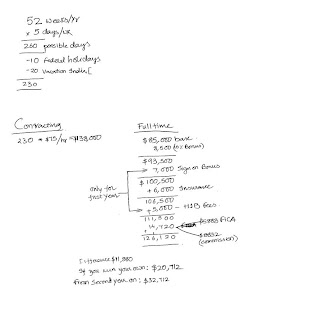
From: http://www.johnkellar.com/2009/06/so-you-want-to-be-consultant-billable.html
More info from:
http://www.biztaxtalk.com/node/3
http://www.cehandbook.com/
http://discuss.joelonsoftware.com/default.asp?joel.3.661943.22
So you want to be a consultant? – Billable Hours
Recently, I have been getting a number of questions about what it takes to be a consultant. This is obviously a huge topic to try and cover in a single post. The conversation usually turns to a question about how much the person should charge for bill rate. This is not easy to answer either, since several factors come into play. To get started at determining your bill rate you really need to think about how many hours you will be able to bill someone for your services. So how many billable hours are REALLY in a year? Let’s look at the numbers.
| 52 weeks in a year x 5 work days each week 260 possible work days each year |
Now that we have a starting point, let’s think about time off. Yes, you have to take time off whether you like it or not sometimes. There are essentially 10 major holidays to consider in the United States. While not all companies close on every holiday, you have to plan for them all since you never know what a company will recognize.
New Year’s Day
Martin Luther King Jr. Birthday
President’s Day
Memorial Day
Independence Day
Labor Day
Columbus Day
Veterans Day
Thanksgiving Day
Christmas Day
Next, consider how much vacation time you plan to take each year. This will be different for everyone, but I use 15 days vacation in my planning. That covers sick days and actual vacation time, remember you don’t get paid when you are on vacation as a consultant. Let’s apply our time off to the number of days available and see where we fall.
260 possible work days each year
- 10 holidays
- 15 days vacation
235 possible work days remaining each year
So you might think you can stop here and you could, but I don’t recommend it. Ask any recruiter how many billable hours are in a year and you will probably hear a number around 2000 hours. That number sure sounds great, but this is not a perfect world. You may or may not be on a contract for the duration of the year, consultants experience change and you must be ready. So below I have two scenarios, the first is a scenario where you will have no more than 5 days of not being on a contract and the second is a scenario where you will have 25 days of no work. This may or may not be representative of what you will experience, but better to prepare for the worst.
| Good Scenario | Bad Scenario |
235 possible work days | 235 possible work days |
So there you have it, plan for both scenarios and you should have a good idea of where to get started with bill rate.
Posted by John Kellar at 11:13 PM
Labels: Consulting
4 comments:
Mark Holmes said...
Back in the "good old days" of 1998 I was told that a consultant should charge twice the hourly rate of a salaried employee; does that still hold true? i.e. an experienced FoxPro developer at $50k salaried (estimating 2000hrs/year) = $25/hr salaried would translate into $50/hr as a consultant. And yet, the consultants hired by my employer (in Denver) were charging corporations $125/hr. Is that even reasonable nowadays?
June 24, 2009 11:54 PM
John Kellar said...
Most salaried employees have very diverse salaries, so the formula you mentioned could vary widely. I would venture to guess that most salaried employees are not getting paid a market wage either, so you could undercut yourself.
A number of things come into play when deciding a billable rate. For example:
- Supply and demand
- Experience of the individual
- The type of service being rendered (i.e. architecture, development, strategic consulting)
The list can go on. As to your question about $125 being a reasonable rate. It depends. :) I know people who would accept $50/hr and others who charge much more. If you can ask for $125 and someone is willing to pay that rate, then it is reasonble.
June 25, 2009 12:24 AM
Joe Webb said...
Good information. John!
There's also a fair amount of non-billable work that must be done either during the work day (taking way from billable hours) or during the evenings (taking time away from your family). Tasks such as creating/updating your web site, filling out state and local tax forms, etc.
Another consider is that if you're doing primarily project based work rather than augmenting a client's IT staff (contracting), you may end up spending a non-trivial amount of time meeting with prospects, writing proposals, etc.
June 25, 2009 6:59 AM
John Kellar said...
Thanks Joe, two excellent points. I actually count these types of tasks as no contract time, but didn't do a good job pointing that out in the post.
- Many people do these types of activities outside of their billable hours, but they definitely take their toll. It goes to show that you should not expect to be a 9-5 person if you are consulting on your own.
- The project versus contracting is definitely different and requires a considerable effort to keep projects coming. Even if you are just contracting, if you are getting your own work it can be very time consuming.
No comments:
Post a Comment